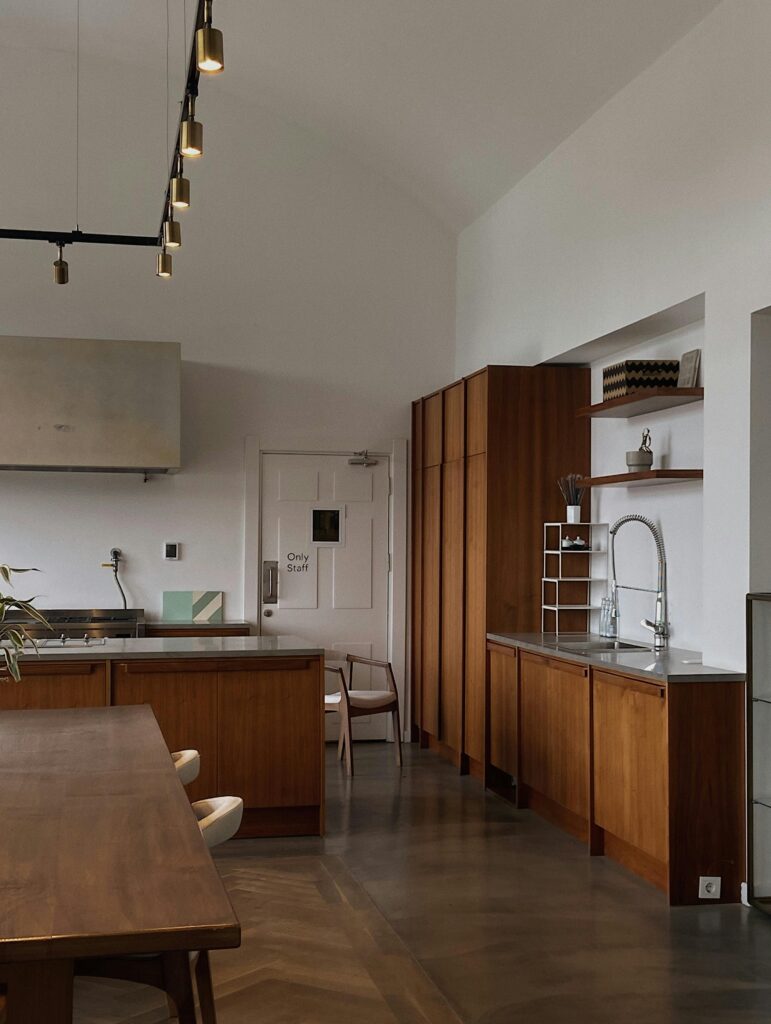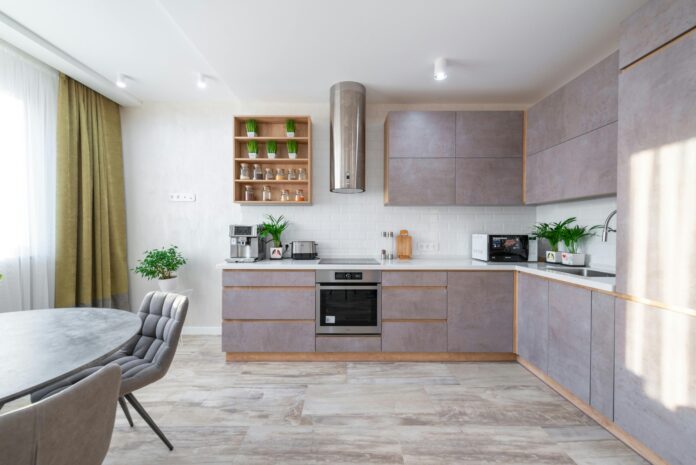Introduction
Choosing the best kitchen flooring options is essential for both the aesthetic and functional aspects of your kitchen. In this kitchen flooring guide, we’ll explore various materials, from durable tile and vinyl to stylish hardwood and eco-friendly bamboo. Every flooring option comes with its own advantages and drawbacks, so it’s essential to choose the one that aligns best with your lifestyle, budget, and design preferences.. This guide will help you navigate the key considerations and popular choices for your kitchen flooring.
Best Kitchen Flooring Options for a Stylish and Durable Kitchen

When choosing the best kitchen flooring options, it’s important to balance aesthetics with functionality. Your kitchen floor needs to handle high traffic, frequent spills, and occasional dropped items, all while maintaining a beautiful appearance. Some of the top choices for kitchen flooring include tile, vinyl, hardwood, and laminate. Each of these options offers unique benefits, from the water resistance of tile to the warmth of hardwood, allowing you to find the perfect fit for your kitchen’s needs and style.
Essential Factors to Consider When Selecting Kitchen Flooring
Durability and Longevity
One of the most important factors in kitchen flooring is its durability. Your kitchen floor must endure frequent spills, heavy foot traffic, and the occasional dropped pot or pan without showing signs of wear.
How Flooring Material Impacts Durability
Different materials offer varying levels of durability. For example, tile and stone tend to be more durable than wood or laminate, while vinyl and cork are known for their resilience.
Water and Stain Resistance
Water resistance is a critical factor in any kitchen, given the frequent spills and moisture exposure. Choosing a material that can withstand moisture without damage is key to ensuring your floor lasts.
Why Water Resistance Matters
Kitchens are prone to spills and leaks, so water-resistant flooring like tile, vinyl, or stone can help prevent damage. Wood flooring, while beautiful, can warp or crack if exposed to excessive moisture.
Cleaning and Maintenance Needs
Stain resistance is another important consideration. Flooring materials like porcelain tile and vinyl are easy to clean and maintain, while others, like natural wood or stone, may require more upkeep to keep them looking their best.
Aesthetics and Style
Your kitchen flooring should complement the overall design and aesthetics of your home. The right choice will enhance your kitchen’s look while blending seamlessly with your countertops, cabinets, and walls.
Matching Flooring with Kitchen Design
Think about how your flooring selection will seamlessly complement the overall design and aesthetic of your kitchen. For example, hardwood or stone flooring works well in traditional and rustic kitchens, while sleek, modern kitchens often benefit from tile or laminate.
Color and Texture Considerations
Flooring comes in a variety of colors and textures. Lighter colors can make a kitchen feel more open, while darker tones create a warm, intimate atmosphere. Textured finishes also add character and help conceal dirt and scratches.
Popular Kitchen Flooring Options
Tile Flooring
Tile is a popular kitchen flooring option known for its durability and water resistance. It comes in a diverse array of colors, styles, and textures, offering great versatility to suit any kitchen design.
Benefits of Ceramic and Porcelain Tile
Ceramic and porcelain tiles are highly durable, easy to clean, and resistant to both water and stains. Porcelain is slightly denser and more durable, making it an excellent option for high-traffic kitchens.
Drawbacks of Tile Flooring
Tile can be cold and hard underfoot, which may not be ideal for comfort. Additionally, grout lines can stain over time and require regular maintenance.
Vinyl Flooring
Vinyl flooring has significantly evolved, now offering impressive advancements in both design and quality. It is an affordable, water-resistant option that is easy to install and maintain, making it a practical choice for busy kitchens.
Advantages of Vinyl as a Budget-Friendly Option
Vinyl is one of the most budget-friendly flooring options available, offering excellent durability and water resistance at a fraction of the cost of natural stone or hardwood.
Vinyl Plank vs. Sheet Vinyl
Vinyl plank flooring mimics the look of hardwood or stone, offering a stylish, affordable alternative. Sheet vinyl, on the other hand, provides a seamless surface, which is ideal for moisture-prone areas.
Hardwood Flooring
Hardwood flooring adds warmth and elegance to any kitchen, making it a popular choice for homeowners seeking a timeless look. However, it tends to need more upkeep compared to other flooring options.
Pros and Cons of Hardwood in Kitchens
While hardwood is beautiful and adds value to your home, it is more susceptible to water damage and scratches.It might need periodic refinishing every few years to preserve its original look and finish.
Engineered Wood vs. Solid Wood
Engineered wood is a more stable option for kitchens, as it is less likely to warp due to humidity. Solid wood offers the traditional look of hardwood but requires more care and attention.
Laminate Flooring
Laminate flooring is a durable and affordable alternative to hardwood. It’s simple to install and available in a wide range of styles, making it a flexible choice for contemporary kitchens.
Durability and Cost Considerations
Although laminate is generally durable, it can be prone to moisture damage, especially if water seeps between the seams. It’s best suited for kitchens with low moisture exposure.
Natural Stone Flooring
Natural stone flooring, such as marble, slate, and limestone, is a luxurious option that adds a unique and elegant touch to any kitchen. Each stone has its own distinctive texture and color variations.
Types of Natural Stone: Marble, Slate, and Limestone
Marble is known for its luxurious appearance, while slate offers a more rustic, textured look. Limestone provides a softer, more natural aesthetic but requires sealing to protect it from stains.
Caring for Stone Floors
Natural stone floors need regular sealing to maintain their beauty and protect against stains and moisture. They also require gentle cleaning products to avoid damage.
Conclusion
Choosing the perfect kitchen flooring requires balancing factors like durability, water resistance, aesthetics, and budget. From durable tile to stylish hardwood and eco-friendly bamboo, each option has its benefits and drawbacks. By considering your specific needs and lifestyle, you can select a flooring material that will not only enhance the beauty of your kitchen but also serve you well for years to come.














